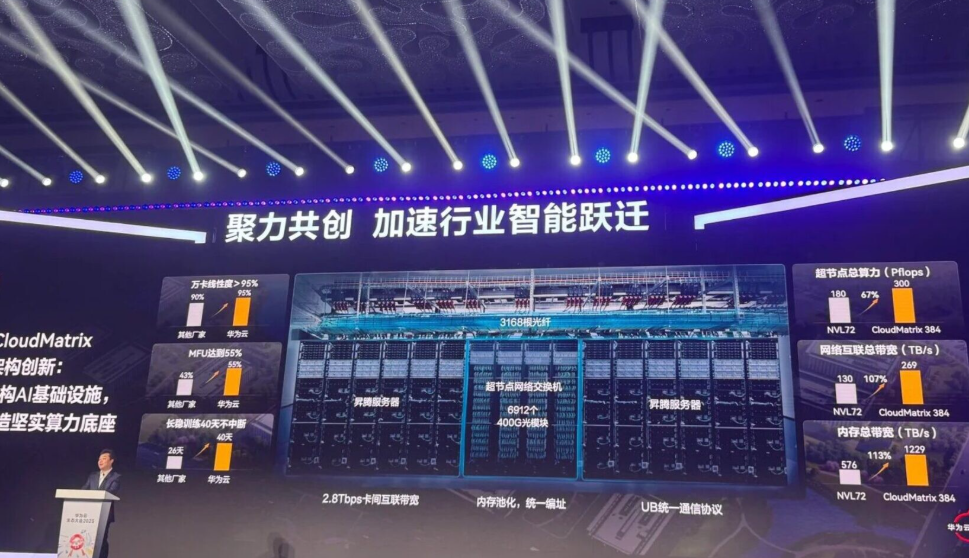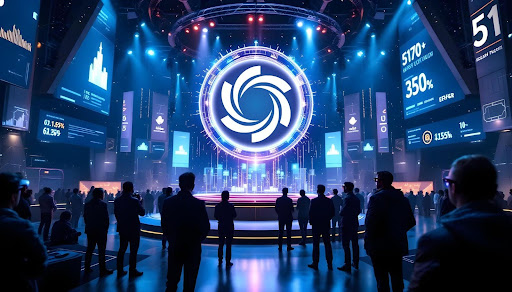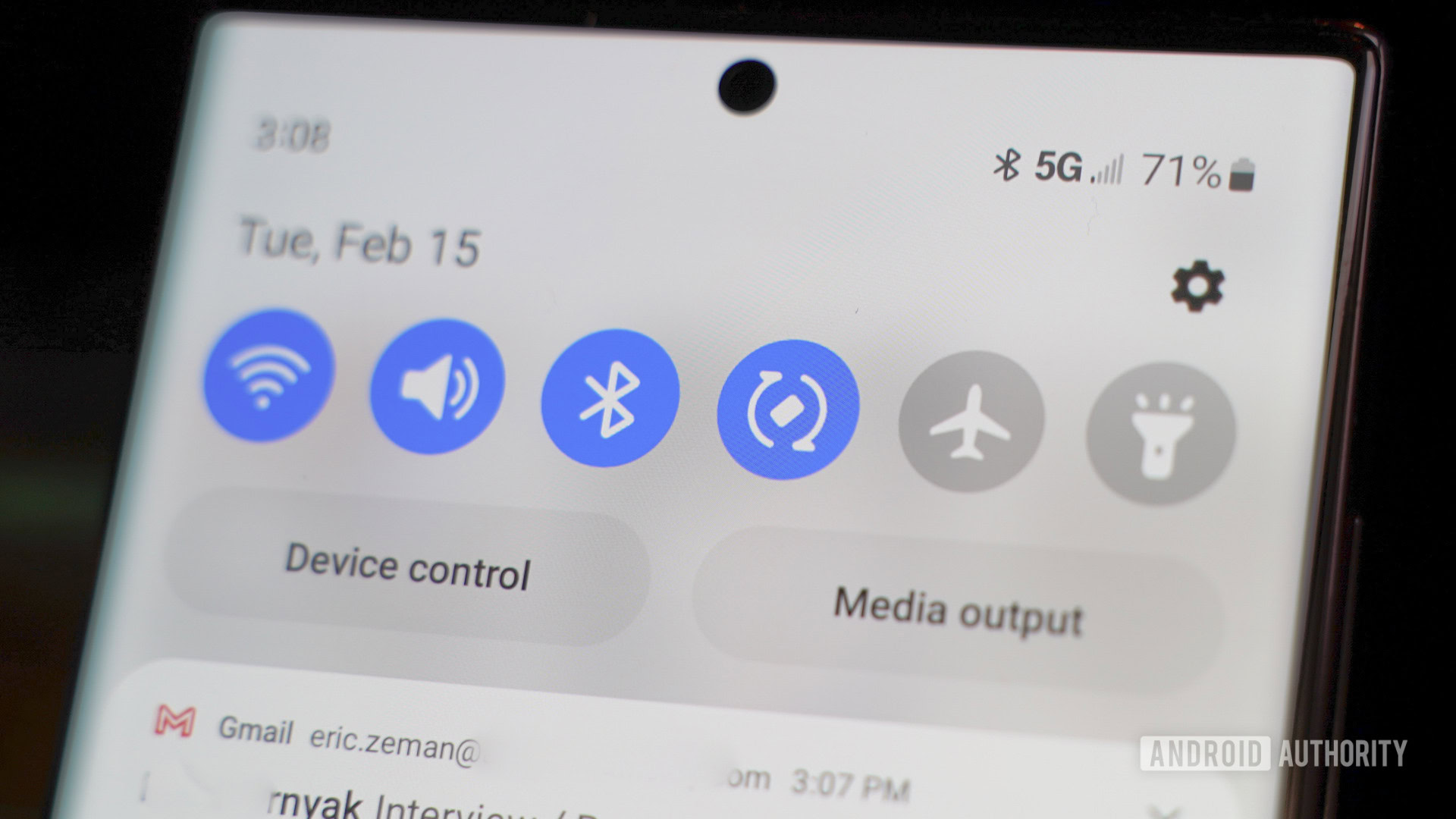China’s Huawei Technologies Co. Ltd. threw down the gauntlet to Nvidia Corp. Saturday when it revealed its most powerful artificial intelligence server system to date. The company unveiled the CloudMatrix 384 system at the World Artificial Intelligence Conference in Shanghai, where dozens of local companies showed off their latest AI hardware.
Reuters reported that Huawei is positioning the new CloudMatrix system as a direct rival to Nvidia’s premium server product, the GB200 NVL72, which is subject to export controls and cannot be sold in China.
CloudMatrix 384 is powered by 384 of Huawei’s most sophisticated AI chips, the Ascend 910C graphics processing unit. That compares with just 72 B200 GPUs found in Nvidia’s GB200 NVL72 system.
The design of the CloudMatrix system illustrates Huawei’s strategy for taking on Nvidia in the AI industry. Though Nvidia’s GPUs are more powerful on an individual level, Huawei believes it can overcome this deficiency by stacking more of its chips into a single cluster, allowing them to work together to overcome their lower performance. Huawei terms the idea as a “supernode” chip architecture, and says it has created high-speed network interconnection technology to enable the chips to communicate with each other.
Huawei makes some stunning claims, saying that the CloudMatrix 384 delivers around 300 petaflops of compute performance, surpassing the 180-petaflop limit of Nvidia’s GB200 NVL72 system. It also beats Nvidia’s product in terms of memory and bandwidth, although the tradeoff is that it uses significantly more energy to do so. According to Huawei, the CloudMatrix 384 consumes 559 kilowatts per hour, which means it’s almost four times as power-hungry as Nvidia’s system.
Nonetheless, it’s clear that Huawei has decided that sheer computing power is what counts most of all, and with the launch of the CloudMatrix 384, it can now offer an alternative to Chinese firms that have been blocked from accessing Nvidia’s most advanced GPUs due to U.S. sanctions.
Huawei first revealed the CloudMatrix 384 system in a low-key announcement in April, but it attracted little fanfare then because it wasn’t yet available to customers. However, some analysts did take notice of it/ Dylan Patel from SemiAnalysis said in a blog post that Huawei “now has AI system capabilities that could beat Nvidia.”
Praising Huawei’s networked clustering capabilities, Dylan said the CloudMatrix 384 surpasses the performance of Nvidia’s flagship server rack on a number of key metrics, and said it will become the obvious choice of infrastructure for Chinese AI companies.
Nvidia Chief Executive Jensen Huang said something similar in May, telling Bloomberg that Huawei has been “moving quite fast,” and highlighting the CloudMatrix 384 system as an example of that. Around the same time as the CloudMatrix 384 was announced, Huawei also unveiled an even more advanced processor called the Ascend 920, although that model has yet to go on sale.
Huawei threatens to corner domestic AI market
Huang’s comments came just one month after U.S. President Donald Trump ramped up export controls on Nvidia’s chip exports, banning the company from shipping its H20 GPUs to China – a lower-powered version of the H200 GPU that had been specifically designed to meet earlier prohibitions on exports to China.
Trump’s decision effectively ended all Nvidia chip sales to China, but in a stunning turnaround, the White House reversed its course on July 15, saying it would grant special licenses to Chinese firms that want to import the H20, reopening the market for Nvidia.
At the time, the White House’s AI Czar David Sacks said the U-turn was justified, because it will help Nvidia prevent Huawei from cornering the domestic market and generating more revenue that would be thrown at advanced chip research.
However, that narrative does not tell the full story, for Commerce Secretary Howard Lutnick told Reuters that the decision to grant export licenses was made in connection with a broader trade deal that enables the U.S. to import vital rare earth minerals from China.
In addition, there are question marks about the effectiveness of the U.S. sanctions on China. Last week, Nvidia told CNBC that building data centers with smuggled chips would be a “losing proposition” from a technical and financial perspective, in response to reports that Chinese AI companies are acquiring them from the black market.
Earlier, a Financial Times report revealed that over $1 billion worth of advanced Nvidia chips had been smuggled into China via unofficial channels since May, including the B200 GPUs.
Photo: Huawei
Support our open free content by sharing and engaging with our content and community.
Join theCUBE Alumni Trust Network
Where Technology Leaders Connect, Share Intelligence & Create Opportunities
11.4k+
CUBE Alumni Network
C-level and Technical
Domain Experts
Connect with 11,413+ industry leaders from our network of tech and business leaders forming a unique trusted network effect.
News Media is a recognized leader in digital media innovation serving innovative audiences and brands, bringing together cutting-edge technology, influential content, strategic insights and real-time audience engagement. As the parent company of News, theCUBE Network, theCUBE Research, CUBE365, theCUBE AI and theCUBE SuperStudios — such as those established in Silicon Valley and the New York Stock Exchange (NYSE) — News Media operates at the intersection of media, technology, and AI. .
Founded by tech visionaries John Furrier and Dave Vellante, News Media has built a powerful ecosystem of industry-leading digital media brands, with a reach of 15+ million elite tech professionals. The company’s new, proprietary theCUBE AI Video cloud is breaking ground in audience interaction, leveraging theCUBEai.com neural network to help technology companies make data-driven decisions and stay at the forefront of industry conversations.









